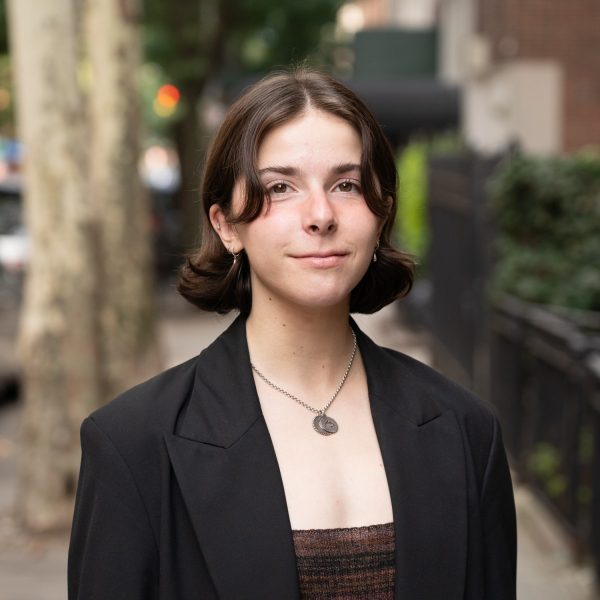NYU disputes failing grade on antisemitism report
NYU criticized a report on antisemitism on college campuses for not including some of the university’s actions against antisemitism on campus, including updating its non-discrimination and harassment policy and hosting a summit to address antisemitism across U.S. universities.
File photo: The entrance of NYU’s Bronfman Center for Jewish Student Life located on 7 E. 10th St. (Samson Tu for WSN)
October 4, 2022
NYU received a failing grade in a recent report rating antisemitism on 25 university campuses. The Sept. 25 report, compiled by watchdog group StopAntisemitism, claimed that students believe the university does not pay enough attention to antisemitism and criticized student groups for hate and bias incidents on campus.
In response to the report, NYU spokesperson John Beckman told WSN that the ranking does not mention the university’s non-discrimination and anti-harassment policies — rules which identify and seek to address incidents of hate and harrassment on campus, including acts of antisemitism. He added that the report ignores a summit that NYU president Andrew Hamilton hosted to address antisemitism in the spring of 2022, which was sponsored by Hillel, the American Jewish Committee and the American Council on Education.
“NYU — which has built what many consider to be the most prominent academic presence in Israel of any major U.S. research university; which has a long, unwavering, and very public record of opposing academic boycotts of Israel; and which has updated its non-discrimination and anti-harassment policy to explicitly prohibit discrimination on the basis of shared ancestry and ethnic characteristics, including antisemitism — utterly and unequivocally rejects antisemitism, and is a leader in combatting it on campus,” Beckman said.
StopAntisemitism uses the International Holocaust Remembrance Alliance definition of antisemitism. That definition has been criticized for suggesting that it is antisemitic to boycott and divest from Israel and support Palestinian rights.
The group also holds an annual poll that names an “antisemite of the year,” in which one individual is chosen from a list provided by the organization. Last year, the head of ice cream company Ben & Jerry’s board of directors, Anuradha Mittal, was given the title due to the company’s decision to stop selling its products in the West Bank and Gaza. In 2020, a City University of New York student and founder of Within our Lifetime — an anti-Zionist student group — was chosen, and in 2019, Democratic U.S. Rep. Ilhan Omar of Minnesota received the title.
Ryan Wasserman, an NYU junior, said he has experienced isolated incidents of antisemitism on campus, noting that he has been told that Jewish people should “get over” the Holocaust, and that a student told him that Jewish people who worked in the twin towers knew about the attacks on Sept. 11 before they happened. Wasserman said that he thinks some antisemitic incidents on campus may stem from the criticism of Israel that he has heard at NYU.
“People who are outspoken against the Israeli government have every right to do that because of the choices that the Israeli government makes and how it extremely harmfully affects people in Israel and in Palestine,” Wasserman said. “Some of the statements and the sentiments that people express against the Israeli government are then extrapolated to the Israeli population, and then extrapolated even more to the Jewish population around the world.”
He added that he does not believe the NYU administration has ever acted in an antisemitic manner, and said the university is supportive of the Jewish community at NYU.
Steinhardt junior Maggie Sonenshine, co-president of the Reform Jewish student group Kesher, said that many resources are available to Jewish students who experience antisemitism on campus, including at the Bronfman Center for Jewish Student Life.
“As an individual within a broader organization, I feel very supported as a Jewish student on campus,” Sonenshine said. “We have very supportive staff members who are here for students, but obviously, I can’t speak for every single Jewish student on campus, because we are a very big school with a lot of different types of people.”
Tisch senior Adora Dayani said that although she feels neutral about StopAntisemitism’s report, she has experienced antisemitism on campus. In her first year at NYU, a Jewish student joked about a swastika that he had made in her Third Avenue North dorm.
“The university doesn’t want to protect against the abundance of antisemitism there clearly is, but I don’t think it has to do with NYU,” Dayani said. “It’s more universal throughout universities than we think it is in our small bubble at NYU, and as sad as that is, that’s the truth of the matter.”
In 2020, a student filed detailing a number of incidents targeting Jewish students from 2017 to 2019. The lawsuit led the university to reach a settlement agreement with the U.S. Department of Education’s Office for Civil Rights to address antisemitism on campus. The agreement requires NYU’s non-discrimination and harassment policy to specifically prohibit antisemitism on campus, and says that the university must respond to complaints of antisemitism, including with disciplinary action.
Contact Carmo Moniz at [email protected].

























































































































































